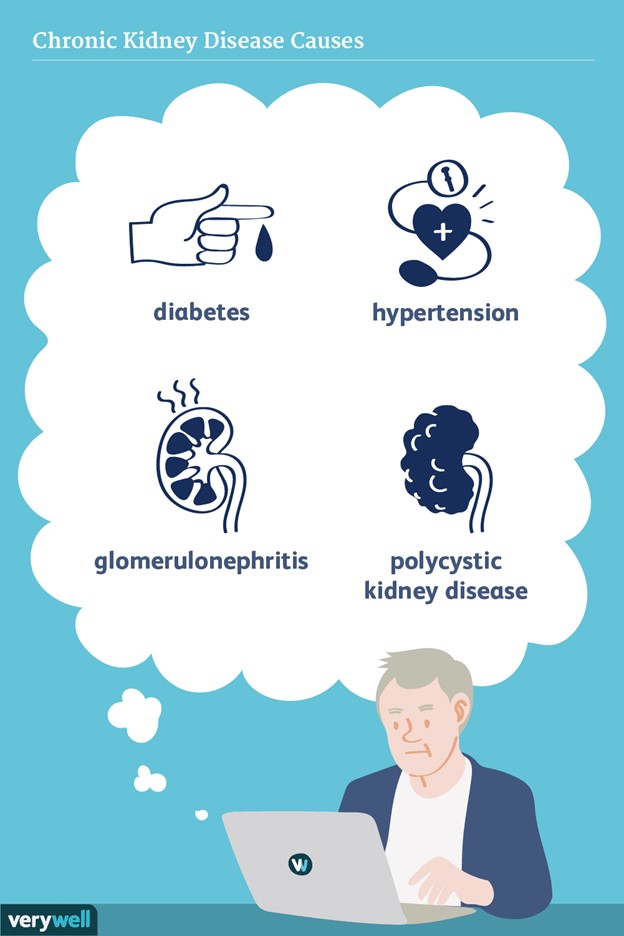Causes and Risk Factors
- Chronic Kidney Disease (CKD): Having a history of CKD significantly increases the risk of progressing to ESRD.
- Diabetes Mellitus: Diabetes, especially poorly controlled, is a leading cause of ESRD.
- Hypertension: Chronic and uncontrolled high blood pressure is a major risk factor for developing ESRD.
- Glomerulonephritis: Inflammatory conditions affecting the kidney's glomeruli can lead to kidney damage and ESRD.
- Polycystic Kidney Disease (PKD): A genetic disorder characterized by the growth of fluidfilled cysts in the kidneys, increasing the risk of ESRD.
- Age: The risk of ESRD increases with age, particularly for individuals over 60 years old.
- Family History: A family history of kidney disease or ESRD may indicate a genetic predisposition.
- Ethnicity: Certain ethnic groups, such as African Americans, Hispanics, and Native Americans, have a higher risk of ESRD.
- Cardiovascular Disease: Conditions like heart disease and atherosclerosis contribute to ESRD risk.
- Obesity: Being overweight or obese increases the likelihood of developing kidney disease and ESRD.
- Smoking: Smoking is associated with a higher risk of kidney disease progression to ESRD.
- Nephrolithiasis: Kidney stones and recurrent urinary tract infections can lead to chronic kidney damage and ESRD.
- Autoimmune Disorders: Autoimmune conditions like systemic lupus erythematosus (SLE) may cause kidney inflammation and ESRD.
- Medications: Certain drugs, such as nonsteroidal antiinflammatory drugs (NSAIDs) and some antibiotics, can cause kidney damage and increase the risk of ESRD.
- Excessive Analgesic Use: Overuse of pain medications, especially analgesics, can lead to kidney damage and ESRD.
- Occupational Exposure: Working in environments with potential nephrotoxic substances increases the risk of kidney disease and ESRD.
- HIV Infection: People with HIV have a higher risk of developing kidney disease and ESRD due to the virus's impact on the kidneys.
- Obstructive Uropathy: Conditions causing urinary tract obstructions can lead to kidney damage and ESRD.

Nursing Test Bank
Naxlex Comprehensive Predictor Exams
Questions on Causes and Risk Factors
Correct Answer is B
Explanation
Correct Answer is B
Explanation
Correct Answer is A
Explanation
Correct Answer is B
Explanation
Correct Answer is A
Explanation
Correct Answer is B
Explanation
Correct Answer is D
Explanation
Correct Answer is B
Explanation
Correct Answer is B
Explanation
Correct Answer is A
Explanation
Correct Answer is D
Explanation
Correct Answer is A
Explanation
Correct Answer is C
Explanation
Correct Answer is B
Explanation
Correct Answer is B
Explanation
Correct Answer is C
Explanation
Correct Answer is A
Explanation
Correct Answer is C
Explanation
Correct Answer is A
Explanation
Correct Answer is D
Explanation
Correct Answer is A
Explanation
Correct Answer is B
Explanation
Correct Answer is A
Explanation
Correct Answer is C
Explanation
Correct Answer is D
Explanation
Search Here
Related Topics
- Enteral nutrition (EN) - Genito-Urinary System Disorders
- Mobility devices: crutches, canes, continuous passive ROM machine. - Genito-Urinary System Disorders
- Bandaging - Genito-Urinary System Disorders
- IV insertion - Genito-Urinary System Disorders
- Immunodefeciency disorders - Genito-Urinary System Disorders
More on Nursing
Free Nursing Study Materials
Access to all study guides and practice questions for nursing for free.
- Free Nursing Study Trials
- Free Nursing Video tutorials
- Free Nursing Practice Tests
- Free Exam and Study Modes
- Free Nursing Revision Quizlets
